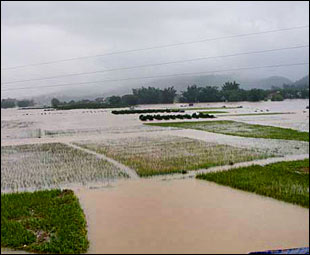The droughts and flooding that have affected a fifth of the country's arable land could lead to a decline in the autumn harvest, agriculture experts have said, warning that the situation could cause further inflation.
Dry weather has caused droughts in 22 of China's 31 provinces, among them major grain production bases, resulting in a loss of grain that was "greater than in previous years", the Ministry of Agriculture said.
About 11 million hectares of arable land have been struck by drought so far this year, 1.7 million hectares more than last year, said ministry figures.
Meanwhile, floods have submerged about 8 million hectares, pushing the total amount of disaster-hit land to about a fifth of the country's 100 million hectares of arable land.
Song Tingmin, vice-president of the China National Association of Grain, estimates the autumn harvest will be 10 percent smaller than normal due to the weather.
The autumn harvest usually accounts for 70 percent of the annual grain production.
Therefore, despite a slight increase in the summer harvest, overall production for the year could be down by 5 percent, Song said yesterday.
The researcher's prediction came as Vice-Premier Hui Liangyu yesterday urged the country to do everything possible to maximize the autumn grain harvest this year, despite serious natural disasters that have affected production in some areas.
Hui said having a good harvest would ensure the country's grain security, a rise in farming income and adequate market supply.
Hui made these comments during a tour of eastern Jiangxi Province, a major grain production base that has been stricken by drought this year.
Although the country's grain output has been rising for three years in a row, some farm products are still in short supply, farmers are vulnerable to natural disasters and domestic prices are often affected by international prices, Hui said.
Still, the National Grain and Oils Information Center, a government-funded grain market supervisory body, gave optimistic forecasts for the autumn harvests in its latest release.
Despite the drought that has hit major corn production bases, including northeast China, corn production is on target to hit 149 million tons, representing a 2.42 percent increase over last year.
The center also forecast that the country's rice output would exceed last year's harvest of 183 million tons by about 3 million tons if the weather were normal.
But an official from the center said the figures were mainly calculated according to the sowing area, and that the effects of the disasters remain a complicated issue.
The expanded sowing area and remedial measures such as post-flood re-sowing could help close the gap, said the official, who declined to reveal his name.
"But we are not optimistic," said the official.
The center has also recognized that the flooding in northeast China would lead to a sharp decline in the already bleak soybean harvest.
The autumn harvest has the center of much speculation because of fears that a shortfall in output could fuel further price hikes.
The CPI grew steadily during the first half of the year, ending with a 5.6 percent rise last month. The government has treated rising food prices -- fuelled by the rising grain price -- as the major reason behind the soaring index.
Cao Changqing, dean of the price bureau under the National Development and Reform Commission, said at a press conference last month that the autumn harvest would be the most decisive factor for the CPI of the latter half of the year.
Song shared this opinion.
"Given the tightened food supply in the international market, the decline in domestic grain production could lead to more price hikes," said Song.
But Song said that given the country's abundant food reserves, a slight decline might not "necessarily" lead to an instant price hike.
"If the movement of grain circulating in the market remains smooth and the amount of food commodities on the market remains abundant, further price hikes could be avoided," said Song.
The State grain stocks have been buying grain from farmers, offering the minimum price possible to ensure farmers earn a profit, but the mechanism has been criticized for taking a long time to bring the grain to market.
(China Daily August 22, 2007)



